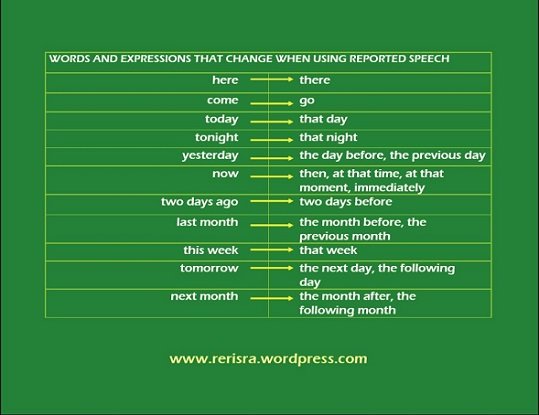Зміст:

Непряма мова в англійській мові вважається справжнім каменем спотикання. Насправді, не так страшний чорт, як його малюють». Хочете переконатися в цьому, тоді наш матеріал стане вам у пригоді.
Існує 2 різновиди мовлення: прямий (Direct Speech) і непрямий (Indirect Speech або Reported Speech). Пряму передають за допомогою звичайного цитування, а непряму за допомогою спеціальних конструкцій і вступних дієслів.
Пряма і непряма мова: короткі приклади, які нам пропонує англійська (з перекладом)
Direct Speech
Indirect Speech
Джулія говорила: «Я люблю зелене листя ранньою весною»
Джулія сказала, що любить зелене листя ранньою весною.
Мати сказала їй: «Відкрий, будь ласка, двері!»
Мати попросила її відчинити двері.
Викладач сказав мені: «У цьому році я їздив в Лондон».
Викладач сказав, що в тому році він був у Лондоні.
Як ви можете помітити, непряма мова та англійська мова – друзі численних змін у пропозиціях, таблиця відображає лише деякі з них. Детальніше про правила переказу прямих висловлювань в оповідання ви прочитаєте далі.
Етапи перекладу прямої мови в непряму

Зміни у прислівниках
Приклади подібних модифікацій:
The boy said that he was reading at that moment. – Хлопчик сказав, що читав в той момент.
(В оригіналі хлопчик говорив: «I am reading now».)
This woman tells me she has lost the key that week. – Ця жінка каже, що загубила ключ на тому тижні.
(В оригіналі жінка каже: «I have lost the key this week».)
The librarian asked to return the book the following week. – Бібліотекар просив повернути книгу на наступному тижні.
(В оригіналі «Return the book next week, please!»)
Правила узгодження часів у непрямій мові
Розглянемо детальніше всі необхідні зміни щодо часових рамок.
Якщо слова автора стоять в теперішньому часі, то «обміну підлягають» тільки займенники і деякі форми дієслова (наприклад, 3-е особа од. числа в Present Simple).
He says, “I swim very well”. (пряма мова)
He says that he swims very well. (непряма мова)
NB! Непряма мова в англійській для передачі вже сталося і побудова відповідних висловлювань може викликати деякі труднощі. Якщо ввідні дієслова стоять в минулому часі, часи дієслів з цитат підлягають наступним модифікаціям.
Reported Speech: Sequence of Tenses (узгодження часів)
Direct Speech
Indirect Speech
“I want to buy a car”
He said (that) he wanted to buy a car.
“I am looking for a kitten”
She said (that) she was looking for a kitten.
“He has won this game”
She said (that) he had won that game.
“She found me at the seaside yesterday”
He said (that) she had found him at the seaside the day before.
“He was playing football”
Mother said (that) he had been playing football.
“I will catch this butterfly”
The boy said (that) he would catch that butterfly.
Can
“I can dive very well”
Must
“You must be here at 5 p.m.”
May
“I may be late a bit”
Could
He said (that) he could dive very well.
Had to
She told me (that) I had to be there at 5 p.m.
Might
He said he might be late
Якщо ви вивчите 2 основні таблиці (тимчасових і наречных змін), модифікувати пропозиції з прямої мови в непряму буде легко і просто. Залишаться лише нюанси, за якими потрібно буде стежити.

Світле (верхнє) хмарка – передача думки в сьогоденні, темне (нижнє) хмарка – передача думки в непрямої мови (в минулому часі)
Непряма мова: особливості переходу різних типів речень
Познайомтеся з цими нехитрими принципами і з легкістю заглиблюйтесь в граматику: тепер англійська, зокрема пряма і непряма мова, не викличе особливих труднощів.
They said, «We have never been here before.» – They said (that) they had never been there before.
He said, «I will clean the car.» – He told me he would clean the car.
He said, «I will have finished this paper by tomorrow.» – He told his teacher that he would have finished that paper by the following day.
She said, «It is very quiet here.» – She said that it was very quiet there.
She said, «I don’t know where are my shoes.» – She said that she didn’t know where her shoes were.
He said, «They won’t sleep.» – He told that they would not sleep.
«I don’t speak Italian,» she says. – She says that she does not speak Italian.
«I cannot find a book anywhere,» she said to him. – She told me that she could not find a book anywhere.
«Take off your shoes,» she told us. – She told us to take off our shoes.
«Stop talking, Joe,» the teacher said – The teacher asked Joe to stop talking.
«Don’t go out without me,» he begged her. – He begged her not to go out without him.
«Don’t repair the computer yourself,» she попереджені him. – She попереджені him not to repair the computer himself.
Helen: What does she say? – He wanted to know what Helen said.
«Where is my umbrella?» she asked. – She wondered where her umbrella was.
«Are you going to the cinema?» he asked me. – He asked me if I was going to the cinema.
«Have you tidied up your room?» the mother asked the twins. – The mother asked the twins whether they had tidied up their room.
“Hurrah! I’ve got the first prize!” – Tomas exclaimed with joy (that) he had got the first prize.
“Wow! What a marvelous dress you are having on.” – She exclaimed with wonder (that) I was having a marvelous dress on.
“Oh, my… i’ve lost my wallet!” – He exclaimed with sorrow (that) he had lost his wallet.
“Come on! You’ll cope with this task.” – She exclaimed with enthusiasm (that) I would cope with that task.
І, наостанок, представимо вашій увазі передачу невеликого діалогу в непрямої мови.
— Hello, Mike! How are you?
— Hi, Jane! I am not well, I have a sore throat. Sorry, I can’t speak to you now…
— Добре, hold on then… i’ll call you in a couple of days.
Reported Speech: Jane greeted Mike and asked him how he was. Mike greeted Jane in response and explained that he was not well. He exclaimed with sorrow that he could not speak to Jane. She expressed her support and added that she would call him in a couple of days.
Зізнайтеся, тепер непряма мова не здається такою вже складною, англійська мова – таким страшним, а багаторазові вправи підвищать вашу майстерність і покращать граматичні навики.
Основні правила непрямої мови з прикладами дивіться у відео.
